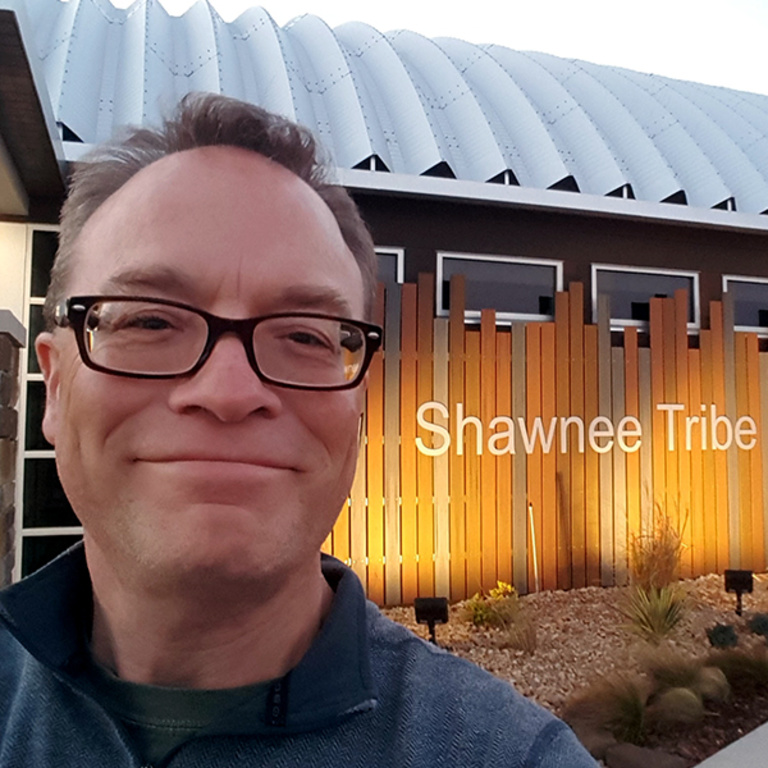Stephen Warren, Ph.D.
As both a teacher and a scholar, Stephen Warren emphasizes that the past is never safely historical. In the classes he teaches, he asks his students to view academic research with a fresh perspective; as avenues for serving the world rather than knowledge that is peculiar and limited to the college classroom.
In his first book, The Shawnees and Their Neighbors, 1795-1870 (The University of Illinois Press, 2005), Warren uses Shawnee history to explore how Native peoples adopted national governments modeled after the United States in response to American missionaries and the federal policy of Indian removal. National governments occupied unstable ground among their people, and tribal citizens often voted with their feet and established new governments rather than abide by the “imagined communities” of the removal era. Warren’s second book, The Worlds the Shawnees Made: Migration and Violence in Early America (The University of North Carolina Press, 2014), stitches together archaeology, history, and ethnography to show how Shawnees made a life for themselves at the crossroads of empires and competing tribes, embracing mobility and often moving willingly toward violent borderlands. Through migration, they and their neighbors adapted to disease, warfare, and dislocation by interacting with colonizers as slavers, mercenaries, guides, and traders. These adaptations enabled them to preserve their cultural identity and resist coalescence, even as Shawnees became known as “the greatest travelers in America.”
Warren’s recent scholarship reflects his growing interest in community-engaged scholarship. In 2017, he edited The Eastern Shawnee Tribe of Oklahoma: Resilience through Adversity (University of Oklahoma Press). This book was the product of a three year, tribally directed project funded by the Administration for Native Americans. In April 2018, he co-authored “Salvaging the Salvage Anthropologist: Erminie Wheeler-Voegelin, Carl Voegelin, and the Future of Ethnohistory,” with Ben Barnes, the Second Chief of the Shawnee Tribe. In 2019, (also with Ben Barnes) he anticipates the release of a second edited volume, Native Americans and Community Engagement, which offers models of collaborative scholarship in the United States and Canada.
His research has been supported by numerous fellowships and grants, including a Mellon Sabbatical Fellowship (2010-2011), a Gilder-Lehrman Short-Term Residential Fellowship from the John D. Rockefeller Library at the Colonial Williamsburg Foundation (2010), and a Lester J. Cappon Fellowship in Documentary Editing from the Newberry Library (2014). In 2009, Warren was a consultant and commentator on the WGBH/American Experience documentary, Tecumseh’s Vision.
Courses Taught:
- Hawkeye Nation: On Iowa and Sport
- History of Iowa and the Midwest
- War and Terrorism in the Americas
- Public History: American Indian Museums and Interpretive Planning
- Food and Culture in Indian Country
- Introduction to American Indian/Native Studies
Research Interests:
- American Indian histories
- Midwestern history
- Ethno-historical methods
Publications:
Books
- Replanting Cultures: Community-Engaged Scholarship in Indian Country
Benjamin Barnes and Stephen Warren, eds.
SUNY Press
(forthcoming) - Resilience through Adversity: The Eastern Shawnee Tribe of Oklahoma (editor)
University of Oklahoma Press
2017 - The Worlds the Shawnees Made: Migration and Violence in Early America
The University of North Carolina Press
2014 - The Shawnees and Their Neighbors, 1795-1870
The University of Illinois Press
2005
